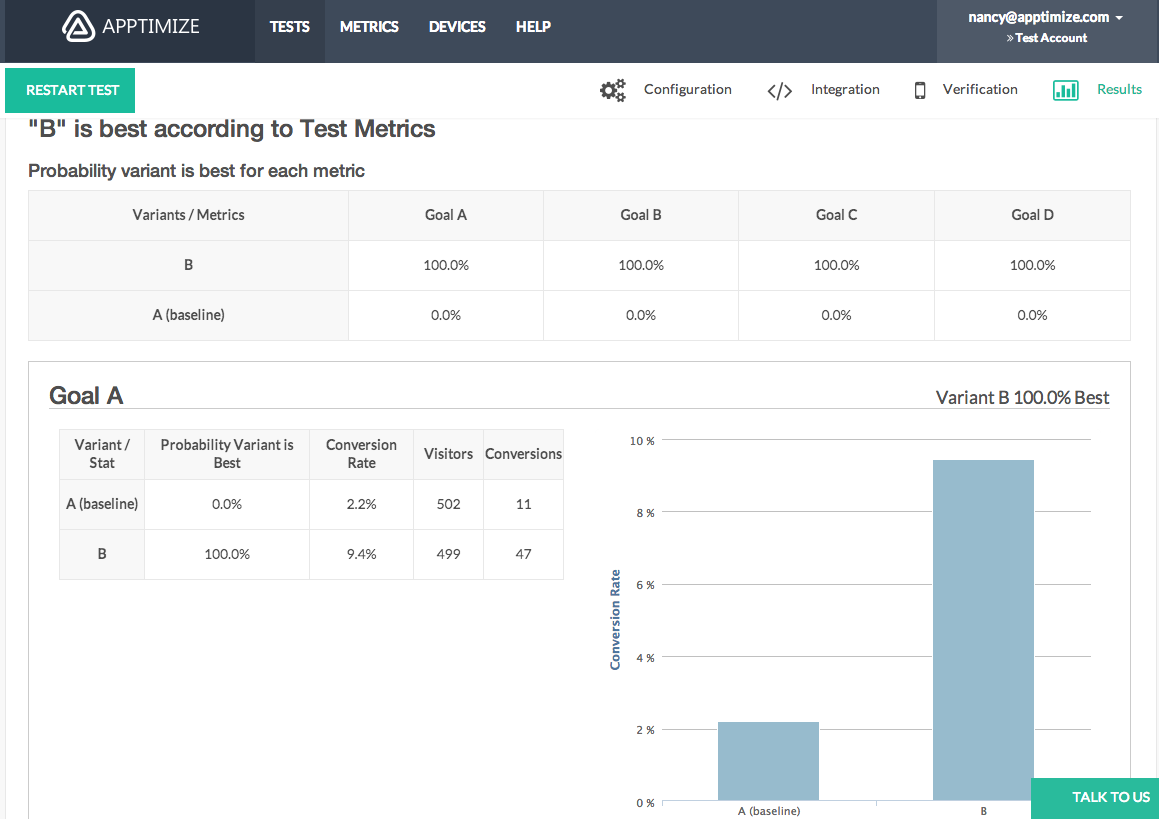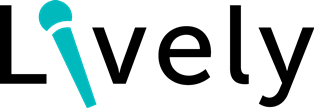 A Q&A with Apptimize co-founder and CEO Nancy Hua. The Mountain View-based startup, which offers a mobile app testing and optimization platform, announced the closing of a $2.1 million Seed funding round in late January from a long list of prominent investors, including Google Ventures, Y Combinator, and Andreessen Horowitz. It was founded in early 2013 by Hua and Jeremy Orlow.
A Q&A with Apptimize co-founder and CEO Nancy Hua. The Mountain View-based startup, which offers a mobile app testing and optimization platform, announced the closing of a $2.1 million Seed funding round in late January from a long list of prominent investors, including Google Ventures, Y Combinator, and Andreessen Horowitz. It was founded in early 2013 by Hua and Jeremy Orlow.
SUB: Please describe Apptimize and your primary innovation.
Hua: App owners use Apptimize to improve their apps using real user data. Apptimize lets you A/B test your native Android and iOS apps. We have a ‘Visual Apptimizer’ that lets you make live visual updates—layouts, buttons, copy, images, colors—to your app without programming or going through the store. We also have a programmatic interface that lets you test anything you can imagine—new features, flows, onboarding experiences. The programmatic interface is not just for A/B testing because our users use it for phased rollouts and feature flagging.
SUB: Who are your target markets and users?
Hua: Anyone with an app should be using Apptimize. Product people love us because they know A/B testing is critical to best practices. Mobile is so important these days; everyone knows that’s where all their growth is. Companies that started as successful websites see that their mobile transactions are surpassing web. Mobile is crucial, but it’s also super new and confusing. We help remove that confusion and set up a systematic approach to dealing with something vital to everyone’s business.
Designers love us because it’s often the first time they can interact with their apps like that—live, and directly without programming. We let them have the freedom and flexibility they have on web with all of the benefits of native. Developers love us because we let you do phased rollouts and feature flagging so they can roll out a feature slowly and roll it back if it needs more work without rolling back all the other bug fixes and other features. This obviously saves a lot of time and effort by removing risk and letting you iterate faster. Plus, we remove work for engineers and make their lives easier because they’re not fiddling with button colors. I think we want to eliminate all the dumb kinds of programming from people’s lives and eliminate unnecessary developer drain as much as possible. Why do you need an engineer to change the text and layout of a button? Why do you need to resubmit through the store just to try different variants of copy? You don’t.
 SUB: Who do you consider to be your competition, and what differentiates Apptimize from the competition?
SUB: Who do you consider to be your competition, and what differentiates Apptimize from the competition?
Hua: Many of our users have tried everything in the space and have been looking for a solution for a long time. Many of them have also tried to build something in-house. They tell us that we’re by far the easiest integration while remaining the most flexible. A lot of the other solutions mess with the way you architect your app and our savvy users hate that kind of thing. A lot of other solutions also don’t even work and overshoot their claims. We understand the space the best, we’re the visionaries and leaders in this category, and we have one of the strongest engineering teams of our size in the valley.
SUB: You just announced that you’ve raised $2.1 million in Seed funding. Why was this a particularly good time to raise funding?
Hua: Our investors are super smart, and I am really loyal towards them because they had the vision and the courage to bet on us early on. I promised them we’d make them a ton of money, and I feel really lucky that they saw how awesome we are and how big the opportunity is that we’re going after. Every time I talk with them, I learn a ton of stuff and feel so inspired.
SUB: How do you plan to use the funds?
Hua: Our main expenses are salaries, kombucha and seaweed. We’re building our team and are growing quickly.
SUB: What was the inspiration behind the idea for Apptimize? Was there an ‘aha’ moment, or was the idea more gradual in developing?
Hua: Jeremy and I were building an app and made an A/B testing framework for it because we couldn’t find any good existing solutions. Robot Invader wanted to use it to test their in-app purchases in their very popular games, and suddenly we were installed in tens-of-millions of downloads of their games. We were like, “whoa,” and it was clear there was a sense of urgency about the idea, so we went all in.
SUB: What were the first steps you took in establishing the company?
Hua: The most common source of startup failure is founder conflict, so the priority was making sure Jeremy and I got along. It seemed the most likely issue that would cause a conflict with a partner is a misalignment in ambition and communication. Often people’s ambitions aren’t aligned because their lives are out of phase. It’s not anyone’s fault, but if the ambitions aren’t aligned in a relationship then you become burdens to each other. Jeremy and I are both committed to taking it all the way. We also are able to communicate very openly and honestly about our emotions and ideas. Even when it’s really tough and we’re grouchy, we know we can rely on and trust each other and talk about the situation honestly. I wanted to know I had someone I could tell anything to, because I don’t want to have to not say what I’m thinking in my own company. I want to be my blunt, offensive self, and Jeremy handles it well. Whenever we disagree, we end up changing each other’s minds so that our opinions oscillate until we converge on a mutual truth.
SUB: How did you come up with the name? What is the story or meaning behind it?
Hua: We A/B tested probably 100 names, and Apptimize was by far the most popular in terms of people liking and remembering it. Apptimize is a combination of ‘application’ and ‘optimize’ because we optimize apps.
SUB: Do you have plans to seek additional outside funding in the near future?
Hua: We had opportunities to raise a Series A, and decided to focus on other stuff for now. I think one thing that happens when you have money is you start to understand its limitations. Money isn’t our limiting reactant, so we’re focused on people and product.
 SUB: What have the most significant challenges been so far to building the company?
SUB: What have the most significant challenges been so far to building the company?
Hua: We’re super picky about hiring. We have turned down ex-CTOs of companies that have raised tens-of-millions of dollars, people who’ve made millions at Facebook and Google, many super-hot geniuses—because we don’t hire unless we’re sure someone’s a fit for our unique band. Everyone we hire is extremely ambitious, obsessive over code quality, open and honest in their communication, mentally flexible, passionate about the team, and extremely generous and selfless. It’s one of our goals to build one of the top teams in the world, and I think we’re well on our way. People in our YC batch remarked that we were one of the teams with the “strongest technical chops,” which is extremely gratifying to hear from other YC founders who are obviously super talented.
One of the main reasons I started a company is because I wanted to work with exactly the people I wanted to work with, and we all really love each other and would do anything for the team, because if it’s not really fun and awesome, then why are we doing this anyway? I think my love language is work, and the best way for me to bond with people is to work on something world changing with them. We’re weird and happy and love each other and work all the time. On weekends everyone goes to my hack house, which is called ‘chaos legion.’
SUB: How do you generate revenue or plan to generate revenue?
Hua: Our value proposition is obvious. A/B testing is a fundamental part of good development, and we are focused on providing everything our users need to increase in awesome. We want to be in every app and I want our fates to be aligned with the fates of our users. We’re going to make sure all our users are benefiting from our product. After our users use us, we want them to think: “Wow, I kick ass. I just made my app even more awesome.” When that happens, our revenues follow.
SUB: What are your goals for Apptimize over the next year or so?
Hua: We’ve got some amazing stuff coming up on the product side. The team is coming together really well, and that was one of the main goals I had for early 2014. As for our users, we want no less than to transform how apps are made and maintained. Apps are right now where the web was in the nineties; nineties websites look quaint to us today because web optimization didn’t exist then. When all apps start getting apptimized, apps will become amazing the way modern websites are amazing compared to nineties websites. We are the drivers of that change, and our technology will help elucidate user behavior and transform the user experience. Our users are super-innovative and using our technology to do amazing things. I am really excited!












